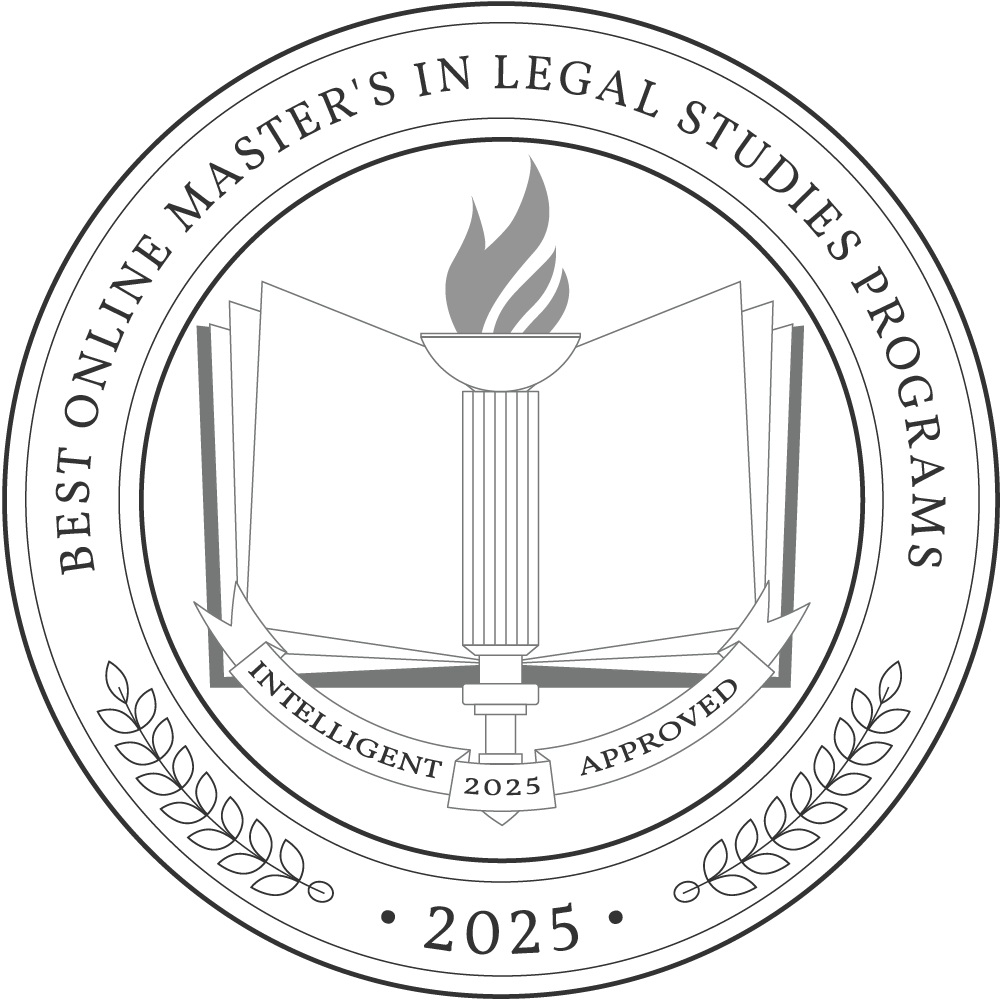Students who complete a master’s degree in legal studies will learn more about the fields of law and business and the connections between the two, and this may help students earn senior-level positions that require specialized legal knowledge. For example, graduates could start a career as a compliance officer, with a median annual wage of $75,670.
These online master’s programs typically require 30-60 credit hours, and most full-time students can complete all of the required coursework within two years (some accelerated programs even confer a degree within one year). The average tuition for a graduate degree program is $20,513 per year.
Why Trust Us
The Intelligent.com Higher Education Team is dedicated to providing students with independent, equitable school and program rankings and well-researched resources. Our expert-driven articles cover topics related to online colleges and programs, paying for school, and career outlooks. We use data from the U.S. Department of Education’s College Scorecard, the National Center for Education Statistics, and other reputable educational and professional organizations. Our academic advisory team reviews content and verifies accuracy throughout the year for the most current information. Partnerships do not influence rankings or editorial decisions.
- Analyzed over 2,000 national, accredited, and nonprofit colleges and universities
- 800+ rankings pages are reviewed and updated yearly
- Content is informed by reputable sources, surveys, and interviews with academic advisors and other experts
- Over 100 data points are reviewed for accuracy and quality throughout the year, including sources
How we rank schools
Our list features the best online Legal Studies degree programs at top colleges nationwide. Each school featured is a nonprofit, accredited institution — either public or private — with a high standard of academic quality for post-secondary institutions.
We evaluated each school’s program on tuition costs, admission, retention and graduation rates, faculty, reputation, and the student resources provided for online students. We collected data from trusted sources like the National Center for Education Statistics, individual school and program websites, school admissions counselors, and other data sources. Then, we calculated the Intelligent Score on a scale of 0 to 100 based on the following criterion:
Academic Quality:
- Admission rate versus enrollment rate
- Retention rate of students who return after year one
- Accreditation status (regional and programmatic)
- Nonprofit status, both private and public institutions
Graduation Rate
- Overall graduation rate
- Total number of currently enrolled students, including diversity metrics
- Student-to-faculty ratio
Cost and ROI
- In-state and out-of-state per-credit tuition rates and fees
- Required credits to graduate
- Earning potential after graduation
- Availability of federal student loans, scholarships, and other financial aid options
Student Resources
- Available student services for online-only and hybrid programs
- On-campus amenities like tutoring centers and the number of libraries
Read more about our ranking methodology.
Best 16 Accredited Online Master's in Legal Studies Programs
FiltersInstitution Type
Status
- Intelligent Score
- Alphabetically By University Name
- Acceptance Rate
- Enrollment
- In-state Graduate Tuition
- Out-of-state Graduate Tuition
- In-state Undergraduate Tuition
- Out-of-state Undergraduate Tuition

Texas A&M University School of Law
Intelligent Score: 99.47In-state: $8,395
Out-of-state: $36,849
In-state: $6,775
Out-of-state: $6,775
SAT: 1160-1380
ACT: 26-32
$1,167
Online, Hybrid
Southern Association of Colleges and Schools Commission on Colleges
30

University of Illinois Springfield
Intelligent Score: 99.29In-state: $14,317
Out-of-state: $33,824
In-state: $15,016
Out-of-state: $15,016
SAT: 1200-1460
ACT: 27-33
$366
Online, On-Campus
Higher Learning Commission
36

Arizona State University
Intelligent Score: 98.80In-state: $10,710
Out-of-state: $28,800
In-state: $11,720
Out-of-state: $11,720
SAT: 1100-1320
ACT: 21-28
$576
Online
Higher Learning Commission
30

University of Arizona
Intelligent Score: 97.26In-state: $10,990
Out-of-state: $33,273
In-state: $11,938
Out-of-state: $11,938
SAT: 1090-1350
ACT: 21-29
$700
Online
Western Association of Schools and Colleges Senior College and University Commission
30

The University of Oklahoma
Intelligent Score: 96.41In-state: $4,788
Out-of-state: $20,169
In-state: $6,943
Out-of-state: $6,943
SAT: 1100-1300
ACT: 23-29
Resident: $584
Non-Resident: $1,059
Online, On-Campus
Higher Learning Commission
32

Washington University in St. Louis
Intelligent Score: 96.16In-state: $56,300
Out-of-state: $56,300
In-state: $56,300
Out-of-state: $56,300
SAT: 1480-1560
ACT: 33-35
$2,917
Online
Higher Learning Commission
24

West Virginia University
Intelligent Score: 95.35In-state: $8,976
Out-of-state: $25,320
In-state: $10,134
Out-of-state: $10,134
SAT: 1030-1230
ACT: 21-27
$605
Online
Higher Learning Commission
30

Pepperdine University
Intelligent Score: 93.16In-state: $57,750
Out-of-state: $57,750
In-state: $36,200
Out-of-state: $36,200
SAT: 1200-1410
ACT: 26-31
$2,570
Online
Western Association of Schools and Colleges Senior College and University Commission
26

Drexel University
Intelligent Score: 92.26In-state: $53,868
Out-of-state: $53,868
In-state: $36,234
Out-of-state: $36,234
SAT: 1180-1380
ACT: 25-31
$945
Online
Middle States Commission on Higher Education
30

Wayland Baptist University
Intelligent Score: 91.35In-state: $19,996
Out-of-state: $19,996
In-state: $13,482
Out-of-state: $13,482
SAT: 900-1090
ACT: 16-23
$538
Online
Southern Association of Colleges and Schools Commission on Colleges
36

Northeastern University
Intelligent Score: 91.06In-state: $54,360
Out-of-state: $54,360
In-state: $25,264
Out-of-state: $25,264
SAT: 1410-1540
ACT: 33-35
$1,132
Online
New England Commission of Higher Education
30

Pennsylvania Western University
Intelligent Score: 90.12In-state: $28,700
Out-of-state: $33,322
In-state: $31,723
Out-of-state: $31,723
SAT: 950 - 1070
ACT: 20 - 26
Resident: $516
Non-Resident: $526
Online
Middle States Commission on Higher Education
30

Webster University
Intelligent Score: 89.66In-state: $28,500
Out-of-state: $28,500
In-state: $13,500
Out-of-state: $13,500
SAT: 1078-1260
ACT: 20-27
$752
Online, Hybrid
Higher Learning Commission
39

Cleveland State University
Intelligent Score: 88.98In-state: $11,185
Out-of-state: $15,952
In-state: $10,215
Out-of-state: $10,215
SAT: 940-1170
ACT: 18-25
Resident: $1,082
Non-Resident: $1,086
Online
Higher Learning Commission
30

University of Utah
Intelligent Score: 86.90In-state: $7,412
Out-of-state: $26,017
In-state: $6,666
Out-of-state: $6,666
SAT: 1130-1350
ACT: 22-29
$1,087
Online
Northwest Commission on Colleges and Universities
30

Seton Hall University
Intelligent Score: 86.45In-state: $42,920
Out-of-state: $42,920
In-state: $24,372
Out-of-state: $24,372
SAT: 1150-1310
ACT: 25-30
$1,480
Online
Middle States Commission on Higher Education
31
How to Choose an Online Master’s in Legal Studies Program
Choose your area of study
This degree is typically offered as a Master of Legal Studies (MLS), although some programs offer a Master of Arts (MA) or Master of Science (MS). The different degree types have their own approaches, so look carefully at their curricula to determine which is right for you.
Furthermore, many programs will allow you to select a concentration and focus your studies on a particular niche in this field, such as alternative dispute resolution, intellectual property, law and economics, or compliance and legal risk management. If you already know what you would like to do after you graduate, look for programs that closely match these career goals.
Research schools and programs
There are many different online master’s in legal studies programs available, so students need to decide on how they will narrow down this extensive list to a few prospective schools.
You should only apply to institutions that have been approved by a DOE-recognized regional accrediting organization, such as the New England Commission of Higher Education or Northwest Commission on Colleges and Universities. These organizations evaluate schools to ensure they provide students with a high-quality education. Those who attend a school that isn’t regionally accredited may be unable to access financial aid or transfer credits to another institution if needed. Ideally, your master’s in legal studies program will also have programmatic accreditation from the American Bar Association.
Additionally, students should consider cost, as choosing a school within their budget can help graduates avoid accumulating significant student debt.
To learn more about any schools that you’re interested in, you can visit the school’s website, contact an admissions counselor, follow the school on social media, or attend an in-person or virtual open house.
Prepare for tests and applications
Application requirements vary by school and program.
These requirements will specify whether students need to submit GRE or GMAT scores; if so, students will need to take time to study (up to three months) and time to receive results (up to 20 days) into account when considering application deadlines.
Additionally, the application should specify what other materials students need to submit, which may include a cover letter, a personal statement, undergraduate transcripts, and letters of recommendation. As with the test scores, students should give themselves enough time to gather all documents well ahead of the application deadline.
If you are unsure of any of the information you find on a school’s website or have additional clarifying questions, be sure to contact the school’s admissions office and speak with a representative.
Select your program
With the list of prospective schools picked out, students must narrow everything down further to determine which online program(s) for a master’s in legal studies they will be applying to.
Before making your final decision, review your needs and goals again. Do you plan to attend school full-time or part-time? Do you want your program to be as online as possible, or are you fine with a hybrid program that has a fair amount of in-person requirements? Some programs offer asynchronous courses, which can be completed at your own pace, while others only offer synchronous courses, which involve remotely attending lectures and completing assignments at the same time as other students — which of these two online learning formats do you prefer? Your school should accommodate your scheduling needs and learning preferences.
Determine how you’ll pay for your degree
The most reliable way to obtain student financial aid is to complete the Free Application for Federal Student Aid (FAFSA) online each academic year. Filling out the form will qualify students for federal student loans, and the FAFSA is a prerequisite for many scholarships and grants. Institutional aid is harder for graduate students to get, but it’s always worth calling a school’s financial aid office to ask. In some cases, the school may be able to point students in the direction of other financial aid available through the state or through the university that most students don’t know about. Those who already work in the field should see if their employer offers tuition reimbursement benefits as well.
What Can You Expect from an Online Master’s in Legal Studies Program?
In an online master’s in legal studies program, students can expect classes that extensively explore legal and business matters. While the courses are not designed to help graduates become lawyers, they offer a wealth of legal information that can be very useful for those hoping to work in specialized fields (like becoming the compliance officer for a business) or those wishing to pursue their own entrepreneurial goals. Regardless of the exact area of study chosen, students can expect coursework that focuses on topics such as contracts, intellectual property, laws and legal procedures, and legal research and writing.
Most of these online graduate programs for legal studies have been designed to be completed within two years by full-time students, and accelerated programs may allow students to graduate in only one year. In most cases, these programs are fully remote and do not require students to complete any on-campus requirements, but it is always worth asking to be sure.
Potential courses you’ll take in an online master’s in legal studies degree program
- US Law and Legal Analysis: This course is a beginner-friendly introduction to the United States legal system. Coursework focuses on teaching about the different kinds of legal reasoning and how it is used to determine court cases. Overall, the course is a mix of legal theory and application.
- Criminal Law: Students will learn about the burden of proof — how it was first established, how it has changed, and how it must now be met. Additionally, students will learn more about the principles of punishment that guide the country’s legal decisions.
- Intellectual Property: This course focuses on all aspects of intellectual property, and the subject matter is more relevant now than ever because so many people view themselves as “content creators.” In the class, students will learn all about copyrights, trademarks, and patents, as well as the concepts linking these legal concepts together.
- Tort Law: This course closely examines tort law, one of the most important legal fields governing day-to-day business. Students will learn how these laws serve as an essential shield for property and other interests that may constantly be threatened by physical and other forms of harm.
What Can You Do With an Online Master’s in Legal Studies?
Career outlook
Graduates with an online master’s in legal studies have a diverse range of career paths to explore, extending beyond traditional legal roles. Here are some common career paths for individuals with advanced education in legal studies:
- Arbitrator, mediator, or conciliator — Help opposing parties settle disputes by facilitating communication between parties, interviewing claimants and witnesses, and preparing settlement agreements.
- Median annual salary: $71,540
- Projected employment growth (through 2032): 5%
- New job openings projected: 400 annually
- Political scientist — Research political subjects, monitor current events, and provide analysis to organizations such as government agencies, political parties, and labor unions.
- Median annual salary: $132,350
- Projected employment growth (through 2032): 7%
- New job openings projected: 600 annually
- News analyst, reporter, or journalist — Research topics, conduct interviews, and write stories to keep the public updated on noteworthy information.
- Median annual salary: $57,500
- Projected employment growth (through 2032): -3%
- New job openings projected: 6,000 annually
Online Master’s in Legal Studies Degree Program Frequently Asked Questions
How do I apply to an online master's in legal studies degree program?
To apply to an online program for a master’s degree in legal studies, students must navigate the university website and find either a direct link to the application or a link to a third-party application portal. The application page will specify additional documentation students must submit along with the application, likely including GRE or GMAT scores, undergraduate transcripts, application essays, and letters of recommendation.
Students who still have questions about application requirements or just want to verify an application is complete should contact the admissions department for the school in question.
How much does an online master's in legal studies degree program cost?
The average annual tuition for a graduate degree program is $20,513. Private schools tend to be more expensive than public schools, though public schools typically charge out-of-state students a much higher tuition rate than in-state students.
Additionally, the number of credit hours required may affect the cost, as will expenses for books, technological requirements for online learning, and other fees.
How long does it take to earn an online master's in legal studies degree?
Generally, an online master’s in legal studies program can be completed in two years by full-time students. Those who enroll in an accelerated program can complete all the coursework in as little as one year. Most universities offer flexible scheduling for these degree programs, and this can be very beneficial for part-time students who are balancing school with other responsibilities, such as a job and a family.
Ultimately, students need to pick a program and program schedule that best suits their needs and positions them for academic success.
Is an online master's in legal studies worth it?
Earning an online master’s degree in legal studies provides several advantages.
A master’s in legal studies program equips graduates with a deep understanding of legal principles, critical thinking skills, and research capabilities. This knowledge is applicable across various industries, opening doors to roles such as legal consultant, compliance officer, or legal researcher. Additionally, an online master’s program offers networking opportunities, connecting students with legal professionals and experts in the field. The versatility of an online program allows individuals to enhance their legal expertise while accommodating work or other commitments.
For individuals seeking to advance their legal careers, specialize in a specific area of law, or transition to roles requiring legal expertise in non-traditional settings, an online master’s in legal studies offers a flexible and valuable pathway.

